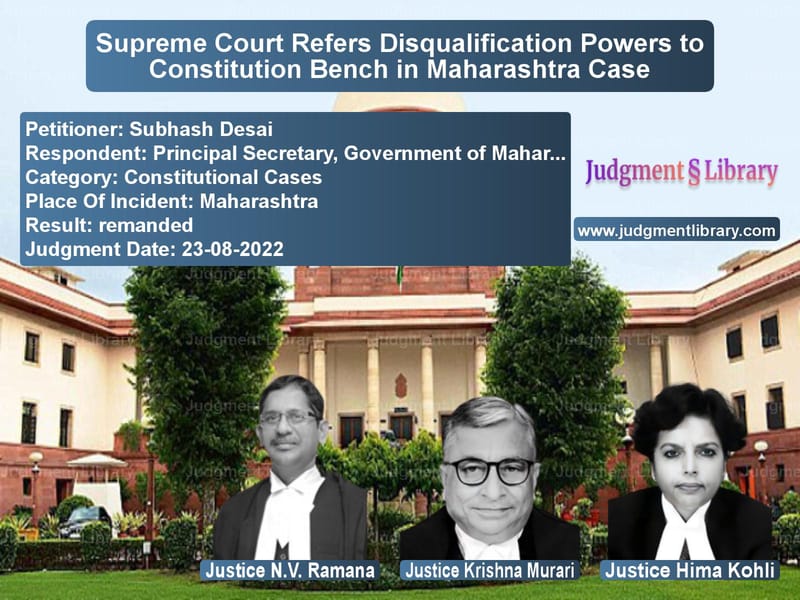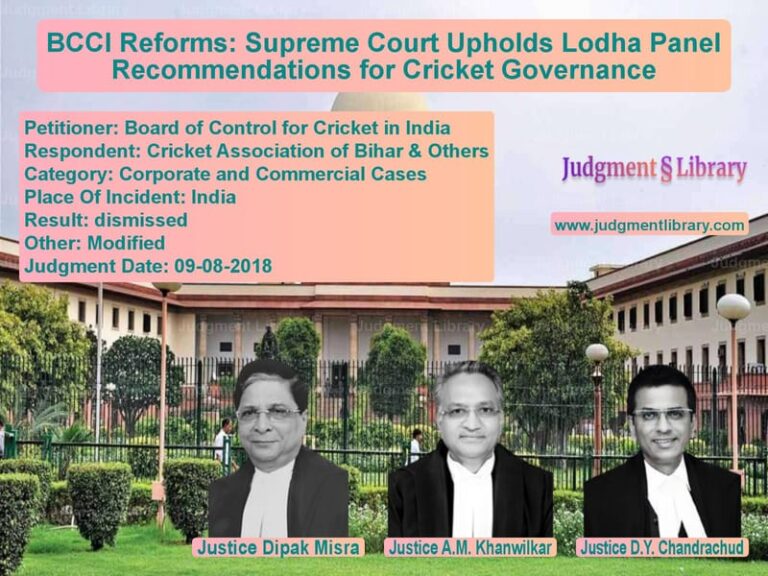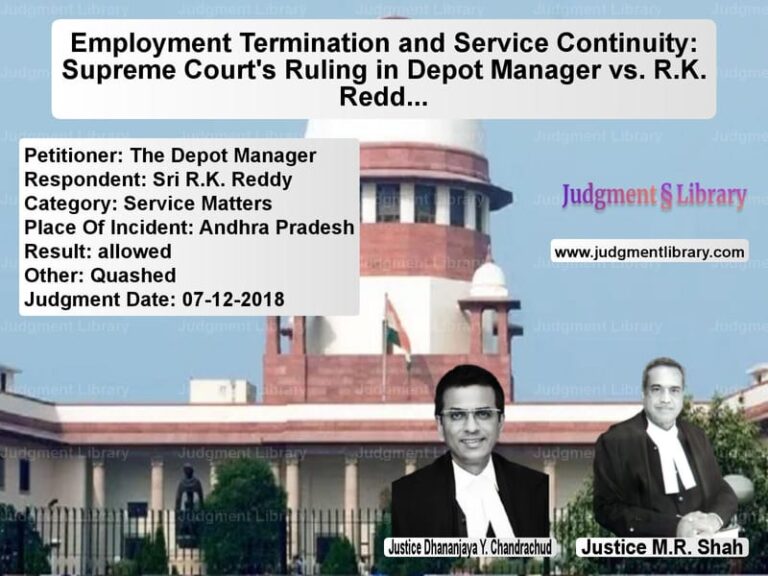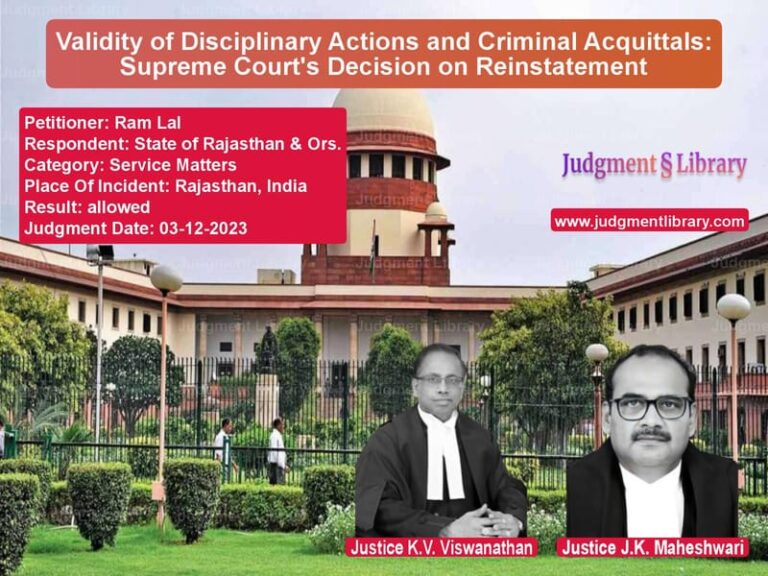Supreme Court Refers Disqualification Powers to Constitution Bench in Maharashtra Case
The Supreme Court of India, in Subhash Desai v. Principal Secretary, Government of Maharashtra & Ors., dealt with important constitutional questions relating to disqualification of Members of Legislative Assemblies (MLAs) under the Tenth Schedule of the Constitution. The case raised questions about the powers of the Speaker in initiating disqualification proceedings, the relationship between disqualification and the removal of a Speaker, and the power of judicial review over the Speaker’s decisions. The Court found that these issues required a detailed examination by a Constitution Bench.
Background of the Case
The matter concerns multiple petitions that were filed by political parties and members of the Maharashtra Legislative Assembly, questioning the disqualification proceedings of certain MLAs under the Tenth Schedule of the Constitution. The primary issue involved the powers of the Speaker to initiate disqualification proceedings when a petition for the removal of the Speaker was already in process.
The key points raised were:
- Whether the Speaker has the authority to continue disqualification proceedings against MLAs when their own position as Speaker is under challenge.
- Whether a petition under Articles 226 or 32 for disqualification can be filed directly before the High Court or Supreme Court.
- What happens to legislative proceedings during the pendency of disqualification petitions.
- The impact of the Speaker’s decision on the date of the disqualification and its effect on subsequent legislative actions.
Petitioner’s Arguments
The petitioners, including the leaders and political members from various parties, argued the following points:
- The disqualification proceedings initiated by the Speaker should be halted because a petition for the Speaker’s removal was already pending.
- Allowing the Speaker to continue with the disqualification proceedings while their own position is under challenge would undermine the constitutional integrity of the process.
- The Speaker’s actions must not interfere with the proceedings of the House, particularly in relation to party leadership and internal party matters.
- The matters raised were crucial and required interpretation by a larger Bench, especially considering the constitutional complexities involved.
Respondent’s Arguments
The respondents, including the Speaker and the State of Maharashtra, made the following arguments:
- The disqualification of MLAs is within the jurisdiction of the Speaker as per the Tenth Schedule, and it is an internal matter of the Legislature.
- There was no constitutional provision that prevents the Speaker from exercising powers regarding disqualification even if a petition for their removal is pending.
- There is no prohibition on the Speaker from continuing with the disqualification proceedings while their own removal proceedings are underway.
- The constitutional scheme allows the Speaker to carry out their functions independently and impartially, even when their own position is contested.
Supreme Court’s Key Observations
The Supreme Court made several important observations in this case:
- Power of the Speaker in Disqualification Proceedings: The Court referred to the case of Nabam Rebia & Bamang Felix v. Deputy Speaker, where it was held that the Speaker should refrain from adjudicating a disqualification petition when their own position is under challenge. However, the Court noted that this judgment has certain contradictions and needs clarification.
- Role of the Constitution Bench: The Court found that these cases raise significant constitutional questions, particularly regarding the interplay between the Speaker’s powers, judicial review, and the removal process. Therefore, the matter needed to be referred to a Constitution Bench.
- Disqualification and Removal of the Speaker: The Court observed that the Tenth Schedule provides for disqualification of MLAs for defection, but the procedural implications of the Speaker’s own removal were complex and needed a larger bench to resolve them.
- Judicial Review of Speaker’s Decisions: The Court also discussed the scope of judicial review over the Speaker’s decision on disqualification, emphasizing that certain actions may be subject to review in exceptional circumstances.
Supreme Court’s Judgment
The Supreme Court made the following orders in this case:
- The matter was referred to a five-judge Constitution Bench for a detailed examination of the constitutional questions involved, particularly the interpretation of the powers of the Speaker under the Tenth Schedule and the interplay of those powers with other constitutional provisions.
- The Court emphasized that the issues raised were of substantial constitutional importance and warranted a thorough examination by a larger Bench.
- The Constitutional Bench would address questions regarding the jurisdiction of the Speaker in disqualification proceedings, the impact of petitions for removal of the Speaker, and the role of judicial review in such matters.
- The Court directed the matter to be placed before the Chief Justice for appropriate orders.
Impact of the Judgment
This ruling has significant implications for the interpretation of the Tenth Schedule and the role of the Speaker in legislative proceedings:
- Clarification of Constitutional Powers: The judgment lays the foundation for clarifying the constitutional scope of the Speaker’s powers, particularly when their position is under challenge.
- Judicial Review of Speaker’s Actions: The ruling also sets the stage for greater clarity on the scope of judicial review over the Speaker’s decisions regarding disqualification, a matter with profound implications for legislative processes.
- Precedent for Legislative and Judicial Interaction: The case highlights the delicate balance between legislative autonomy and judicial oversight, an issue that will guide future cases related to disqualification, party discipline, and the rights of elected representatives.
- Implications for Political Stability: The judgment is likely to influence how political parties and the legislative process handle disqualification proceedings, removal of speakers, and related disputes.
Conclusion
The Supreme Court’s decision in Subhash Desai v. Principal Secretary, Government of Maharashtra & Ors. is a pivotal one for constitutional law, particularly in its treatment of disqualification proceedings under the Tenth Schedule and the powers of the Speaker. By referring the matter to a Constitution Bench, the Court has ensured that these important issues are resolved comprehensively, providing clarity for future cases involving legislative disqualification, judicial review, and political stability.
Petitioner Name: Subhash Desai.Respondent Name: Principal Secretary, Government of Maharashtra & Others.Judgment By: Justice N.V. Ramana, Justice Krishna Murari, Justice Hima Kohli.Place Of Incident: Maharashtra.Judgment Date: 23-08-2022.
Don’t miss out on the full details! Download the complete judgment in PDF format below and gain valuable insights instantly!
Download Judgment: subhash-desai-vs-principal-secretary,-supreme-court-of-india-judgment-dated-23-08-2022.pdf
Directly Download Judgment: Directly download this Judgment
See all petitions in Fundamental Rights
See all petitions in Legislative Powers
See all petitions in Public Interest Litigation
See all petitions in Judgment by N.V. Ramana
See all petitions in Judgment by Krishna Murari
See all petitions in Judgment by Hima Kohli
See all petitions in Remanded
See all petitions in supreme court of India judgments August 2022
See all petitions in 2022 judgments
See all posts in Constitutional Cases Category
See all allowed petitions in Constitutional Cases Category
See all Dismissed petitions in Constitutional Cases Category
See all partially allowed petitions in Constitutional Cases Category







